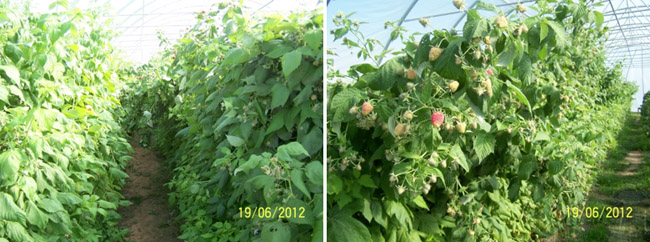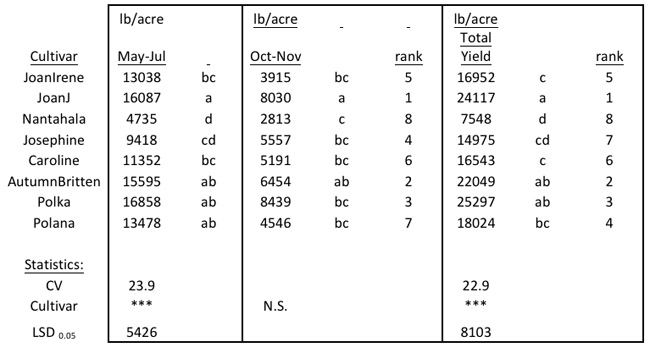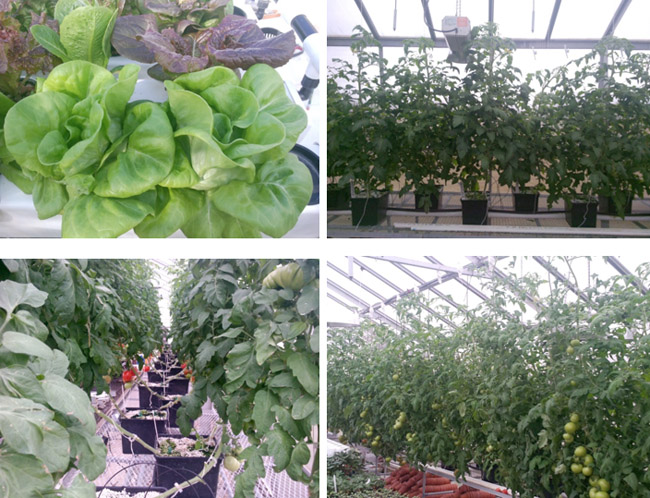"We are what we repeatedly do. Excellence, then, is not an act, but a habit." --Aristotle
Address any questions or comments regarding this newsletter to the individual authors listed after each article or to its editor, Rick Weinzierl, 217-333-6651, weinzier@illinois.edu. To receive e-mail notification of new postings of this newsletter, call or write the same number or address.
In This Issue:
Research Specialist Position Open at the St. Charles Horticulture Research Center
Regional Observations (from Kyle Cecil in western Illinois)
Fruit Production and Pest Management (high-tunnel raspberry production at Dixon Springs)
Vegetable Production and Pest Management (hydroponics at Dixon Springs)
Local Foods Issues (crop insurance for organic growers; archived Small Farms Webinars; International Year of Water Cooperation)
Upcoming Programs
Check the Illinois SARE calendar for a full list of programs and links for registration.
http://illinoissare.org/ and http://illinoissare.org/calendar.php
- Chef / Famer Mixers ... No charge, register online at http://www.surveymonkey.com/s/farmchefmixer
- Peoria - Monday, April 8 – Illinois Central College, North Campus, Dogwood Hall, Culinary Arts Dining Room, 5407 N. University, 6-7:30 p.m.
- Good Agricultural Practices (GAPs), April 8, 15, 22, and 29, 2013 ... webinar series, 6:00 – 8:00 p.m. See the Illinois SARE calendar at http://illinoissare.org/calendar.php.
- Southwestern Illinois Twilight Orchard Meetings, April 18 and May 9, 2013; at Broom Orchard, Carlinville, IL (Macoupin Co.) on April 18 and at Weigel Orchards, Brussels, IL (Calhoun Co.) on May 9. For more information, contact Michelle Berg Vogel, ANR Program Coordinator, University of Illinois Extension Calhoun County Office, P O Box 366, Hardin, IL 62047 (http://extension.illinois.edu; email: mbergv@illinois.edu or call (618) 653-4687.
- GAPs Training (Good Agricultural Practices in relation to food safety), April 19, 2013. 8:00 a.m. – 4:00 p.m., University of Illinois Extension Office, 4618 Broadway, Mt. Vernon, Il 62864. To register, see https://webs.extension.uiuc.edu/registration/?RegistrationID=8100
- Illinois Summer Horticulture Day, June 13, 2013 ... the morning program will be at Curtis Orchard in Champaign, IL, followed by an afternoon tour of the University of Illinois Fruit Research Farm in Urbana and Vegetable Crops Research Farm in Champaign. More details to come, but mark your calendars!
Research Specialist Position Open at the St. Charles Horticulture Research Center
If you are interested and qualified, please apply; if you know someone who might be interested, please pass along the information ...
The Research Specialist supervises operation and management of the University of Illinois St. Charles Horticulture Research Center.
DUTIES AND RESPONSIBILITIES
- Supervision of ongoing research projects to completion.
- Coordination of new research projects initiated by faculty, including assignment of plots, field preparation, planting, application of treatments, and data gathering.
- Initiation of independent research to support production, integrated pest management, post-harvest handling, and marketing of fruits and vegetables in northern Illinois. The incumbent will be expected to apply for grant funding to support research and outreach efforts, both independently and in cooperation with faculty and other academic personnel.
- Presentation of research results and related information to producer audiences.
- Cooperation and collaboration with applied research and Extension efforts of Local Food Systems and Small Farms Extension Educators and Horticulture Extension Educators in northern Illinois.
- Supervision of other REC staff at St. Charles, including the Agriculture Gardener and part-time workers.
MINIMUM QUALIFICATIONS
This position requires an MS in horticulture or a closely related field, PhD in horticulture or closely related field is preferred. A minimum of 2 years of experience in fruit or vegetable production or carrying out field research is required. Experience in making public presentations in teaching and outreach and experience preparing scientific reports and manuscripts are preferred qualifications. Solid understanding of a range of specialty crop production practices is required. The successful candidate must provide evidence of competence and interest in applied field research and demonstrate the ability to design and initiate projects, gather and analyze data, and summarize results, up to and including preparation of manuscripts for publication and presentation of findings to producers. Must possess or be able to obtain an Illinois Pesticide applicator's License.
SALARY
Salary will be commensurate with training and experience.
APPOINTMENT STATUS
This is a 12-month, 100% academic professional position.
LOCATION
The St. Charles Research Center is located in St. Charles, Illinois, approximately 40 miles west of Chicago.
PROPOSED STARTING DATE
This position is available as soon as possible after the closing date or when a suitable candidate is available. The closing date for applications is April 15, 2013.
APPLICATION PROCEDURES
Please create your candidate profile at http://jobs.illinois.edu and upload your cover letter indicating your qualifications, and a detailed resume including the contact information for three professional references by the close date. All requested information must be submitted for your application to be considered. Academic credentials may be required at a later date. Individuals with diverse backgrounds are strongly encouraged to apply.
You may also visit http://cropsci.illinois.edu for additional information about the department. For further information about the position, contact Dr. Richard Weinzierl, Professor and Extension Specialist, Department of Crop Sciences, University of Illinois, email weinzier@illinois.edu, phone 217-244-2126.
Illinois is an Affirmative Action/Equal Opportunity Employer and welcomes individuals with diverse backgrounds, experiences, and ideas who embrace and value diversity and inclusivity.
(www.inclusiveillinois.illinois.www.inclusiveillinois.illinois.edu
Rick Weinzierl (217-244-2126; weinzier@illinois.edu)
Regional Observations
In western Illinois, soil temps have been slowly improving. As of today the 4 inch soil temp at the Monmouth Research Center was 45.9°F. As such, there has not been much going on in the fields. Strawberry growers should not remove mulch until a sustained soil temperature of at least 44 degrees is reached. Another rule of thumb is to remove the mulch from the strawberry planting when about 25 percent of the plants are producing new growth. New growth will be white or yellow in color.
Garlic is showing growth and indicating that we had a very tolerable winter for this crop. Mulch, if you are using it, can be removed to facilitate soil warming after all chances of frost are gone but should be put back on the beds later in the season to facilitate weed control and conserve moisture. Monitor the crop closely if mulch is left on in too wet of conditions which will lead to bulb rot and other problems. Many growers (south of Champaign) are electing to not use mulch in their growing systems because of the moderation of winter soil temperatures. Those north of this location should not try this approach.
Lastly, high tunnels are full of produce and doing very well. Daily temperatures inside these structures have quickly reached the point that daily ventilation is required. For a number of crops, temperatures that are too high early on in the season will result in early bolting and an unmarketable crop. Most tunnels are full of a plethora of lettuce varieties with the most popular being Bibb and Buttercrunch.
Kyle Cecil (309-342-5108; cecil@illinois.edu)
Fruit Production and Pest Management
High Tunnel Raspberry Production at DSAC

Eight cultivars of raspberries were planted in a high tunnel at DSAC in June 2011. A small crop was harvested in the fall of 2011. The plants were headed back in spring of 2012 and a crop was harvested from both the floricanes and primocanes. Harvest began in May and continued into July, then resumed in October and continued into November. The data below represent the means of three replicated 10-foot plots.

Jeff Kindhart (618-695-2770; jkindhar@illinois.edu)
Vegetable Production and Pest Management
Hydroponics at Dixon Springs
We have been evaluating hydroponic lettuce, tomato and strawberry production at DSAC. We have been looking at hydroponic tomato production in both the high tunnel and greenhouse environment. This year's greenhouse We have been evaluating hydroponic lettuce, tomato, and strawberry production at the University of Illinois Dixon Springs Agricultural Center, with hydroponic tomato production in both the high tunnel and greenhouse environments. This year's greenhouse tomato crop was planted in December and began bearing in March. We are evaluating 10 cultivars in a small replicated trial. We are using Bato buckets filled with 2" of hydroton and the balance filled with perlite. The plant growth and crop development in hydroponic systems seems to be quite accelerated. The tomato plants are pruned to a single leader in this system, but the close spacing may allow producers to have higher populations and increased yields over traditional bed systems. Hydroponic systems also afford growers an opportunity to start with a pathogen-free rhizosphere which could reduce incidence of soil borne diseases such as phytophthora, and fusarium. As we gather data we will publish cultivar performance in this newsletter.

Lettuce and tomatoes at the University of Illinois Dixon Springs Ag Center.
Jeff Kindhart (618-695-2770; jkindhar@illinois.edu)
Local Foods Issues
USDA Improves Crop Insurance Options for Organic Farmers
The National Sustainable Agriculture Coalition (NSAC) reports that USDA's Risk Management Agency will be removing the 5% premium surcharge assessed against all organic farmers seeking federal crop insurance, beginning in 2014. NSAC notes, however, that insuring individual crops may still not be the best approach for diversified organic producers, who may be better served by Adjusted Gross Revenue-Lite insurance. For more information, see http://sustainableagriculture.net/blog/organic-surcharge-removed/.
Deborah Cavanaugh-Grant (217-782-4617; cvnghgrn@illinois.edu)
Archived Webinars Available for the 2012 and 2013 Small Farm Webinar Series
The 2012 and 2013 Small Farm Webinar Series has been completed. Copies of all the following webinars are available online at http://web.extension.illinois.edu/hkmw/cat88_3926.html.
- Small Farm Webinar - Basics of Fruit Insect Management
- Small Farm Webinar - Wildlife Damage Control
- Small Farm Webinar- Are You Farm To School Ready?
- Small Farm Webinar- Common Garden Insect Pests
- Small Farm Webinar- Managing Rotations in High Tunnels
- Small Farm Webinar- Managing Weeds in Pastures
- Small Farm Webinar- Pasture Management
- Small Farm Webinar Poultry Nutrition and Health
- Small Farm Webinar- Raising Broiler Turkeys
- Small Farm Webinar- Raising Sheep and Goats
- Small Farm Webinar- Seed Saving
- Small Farm Webinar- Strawberry Production
- Small Farm Webinar- Water Sanitation for Small Farms
- Small Farm Webinar-Beneficial Insects
- Small Farm Webinar-Companion Planting
- Small Farm Webinar-Farm to School Sales; What's Involved?
- Small Farm Webinar-Forest Management
- Small Farm Webinar-Growing Unique Vegetables
- Small Farm Webinar-Season Extension with High Tunnels
- Small Farm Webinar-Seed Saving
- Small Farm Webinar-Soil Science
Deborah Cavanaugh-Grant (217-782-4617; cvnghgrn@illinois.edu)
2013 – the International Year of Water Cooperation
The United Nation General Assembly in its December, 2010 meeting has declared 2013 as the international year of water cooperation. The objectives of this designation are to raise awareness around the world of the challenges facing water resources due to increase in demand, access, allocations, and services. It is also intended to support cross borders cooperation to develop management and equitable distribution agreements of shared water resources and to support the formation of new objectives that will lead to the development of a more sustainable water resources. The UN designated Friday, March 22nd as the International Water Day. The Netherlands is the host county for the first celebration of the World Day. Also, many countries in African and Asian celebrated this day with various events. Unfortunately very little media attention has been given to this day in the US, despite a 2012 report by the United States Office of the Director of National Intelligence, which predicted that within the next ten years, water problems will influence the stability of many countries that impact the national security of the US. It stressed that water shortage combined with "poverty, social tensions, environmental degradation, ineffectual leadership, and weak political institutions," can lead to weakness or even failure of many vulnerable governments.
Here are some facts posted on the UN website (http://www.un.org/en/events/worldwateryear/factsfigures.shtml) explaining the root of the problem.
- 780 million people do not have access to clean water and almost 2.5 billion do not have access to adequate sanitation.
- Six to eight million people die annually from the consequences of disasters and water-related diseases.
- Various estimates indicate that, based on business as usual, ~3.5 planet Earths would be needed to sustain a global population achieving the current lifestyle of the average European or North American.
- Global population growth projections of 2–3 billion people over the next 40 years, combined with changing diets, result in a predicted increase in food demand of 70% by 2050 (Bruinsma, 2009).
- Agriculture accounts for ~70% of global freshwater withdrawals (up to 90% in some fast-growing economies).
- Shifting diets from predominantly starch-based to meat and dairy require more water. Producing 1 kg of rice, for example, requires ~3,500 L of water, 1 kg of beef ~15,000 L (Hoekstra and Chapagain).
While I know very little about the politics of water in the US, there has been a long-term California-Oregon feud over the Klamath Basin, and in 2000 Colorado and five other states expressed concerns about California's use of 800,000 acre-feet of water beyond its entitlement. The drought of 2011 and 2012 serve as additional reminders of why we need to be a part of the International Year of Water Cooperation.
Mosbah Kushad (217-244-5691; kushad@illinois.edu)
Less Seriously ...
At a North Dakota high school, a group of students decided they would play a prank. They let three goats loose inside the school, but first painted a number on the side of each goat: 1, 2, and 4.
Administrators spent most of the day looking for number 3.
University of Illinois Extension Specialists in Fruit and Vegetable Production & Pest Management
Extension Educators – Local Food Systems and Small Farms |
||
Bronwyn Aly, Gallatin, Hamilton, Hardin, Pope, Saline, and White counties |
618-382-2662 |
|
Katie Bell, Franklin, Jackson, Perry, Randolph, & Williamson counties |
618-687-1727 |
|
Sarah Farley, Lake & McHenry counties |
847-223-8627 |
|
Nick Frillman, Woodford, Livingston, & McLean counties |
309-663-8306 |
|
Laurie George, Bond, Clinton, Jefferson, Marion, & Washington counties |
618-548-1446 |
|
Zachary Grant, Cook County | 708-679-6889 | |
Doug Gucker, DeWitt, Macon, and Piatt counties |
217-877-6042 |
|
Erin Harper, Champaign, Ford, Iroquois, and Vermillion counties |
217-333-7672 |
|
Grace Margherio, Jackie Joyner-Kersee Center, St. Clair County |
217-244-3547 |
|
Grant McCarty, Jo Daviess, Stephenson, and Winnebago counties |
815-235-4125 |
|
Katie Parker, Adams, Brown, Hancock, Pike and Schuyler counties |
217-223-8380 |
|
Kathryn Pereira, Cook County |
773-233-2900 |
|
James Theuri, Grundy, Kankakee, and Will counties |
815-933-8337 |
|
Extension Educators – Horticulture |
||
Chris Enroth, Henderson, Knox, McDonough, and Warren counties |
309-837-3939 |
|
Richard Hentschel, DuPage, Kane, and Kendall counties |
630-584-6166 |
|
Andrew Holsinger, Christian, Jersey, Macoupin, & Montgomery counties |
217-532-3941 |
|
Extension Educators - Commercial Agriculture |
||
Elizabeth Wahle, Fruit & Vegetable Production |
618-344-4230 |
|
Nathan Johanning, Madison, Monroe & St. Clair counties |
618-939-3434 |
|
Campus-based Extension Specialists |
||
Kacie Athey, Entomology |
217-244-9916 |
|
Mohammad Babadoost, Plant Pathology |
217-333-1523 |
|